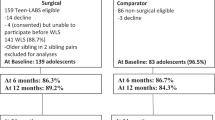Abstract
OBJECTIVE: To examine the effects of weight loss on health-related quality of life (HRQL) in subjects with severe obesity.
DESIGN: Controlled clinical trial of the outcomes of surgical vs conventional weight reduction treatment.
SUBJECTS: The first 487 surgical cases and their conventionally treated, matched controls were followed for two years in the Swedish Obese Subjects (SOS) intervention study.
MEASUREMENTS:
A battery of generic and study-specific self-assessment instruments or subscales was used to characterize HRQL in the severely obese (BMI) ≥34 kg/m2 for males and BMI ≥38 kg/m2 for females). Measures of general health perceptions (general health rating index; current health), mental well-being (mood adjective check list; pleasantness, activation and calmness), mood disorders (hospital anxiety and depression scale; anxiety and depression) and social interaction (sickness impact profile), were supplemented by obesity-specific modules on obesity-related psychosocial problems and eating behavior (three-factor eating questionnaire; restrained eating, disinhibition and perceived hunger). Assessments were conducted prior to treatment and repeated after 6, 12 and 24 months.
RESULTS: Poor HRQL before intervention was dramatically improved after gastric restriction surgery, while only minor fluctuations in HRQL scores were observed in the conventionally treated controls. Peak values were observed in the surgical group at 6 or 12 months after intervention with a slight to moderate decrease at the two-year follow-up. The positive changes in HRQL after two years were related to the magnitude of weight loss, that is, the greater the weight reduction, the greater the HRQL improvements. Eating behavior improved accordingly.
CONCLUSION: Quality of life in the severely obese is improved by substantial weight loss. Most patients benefit from weight reduction surgery, while HRQL in surgical patients with minor reduction in overweight is less positive. Further research is needed to determine outcome predictors of the surgical management of severe obesity and to ensure that HRQL improvements are maintained.
This is a preview of subscription content, access via your institution
Access options
Subscribe to this journal
Receive 12 print issues and online access
$259.00 per year
only $21.58 per issue
Buy this article
- Purchase on Springer Link
- Instant access to full article PDF
Prices may be subject to local taxes which are calculated during checkout
Similar content being viewed by others
Author information
Authors and Affiliations
Corresponding author
Rights and permissions
About this article
Cite this article
Karlsson, J., Sjöström, L. & Sullivan, M. Swedish obese subjects (SOS) – an intervention study of obesity. Two-year follow-up of health-related quality of life (HRQL) and eating behavior after gastric surgery for severe obesity. Int J Obes 22, 113–126 (1998). https://doi.org/10.1038/sj.ijo.0800553
Received:
Revised:
Accepted:
Published:
Issue Date:
DOI: https://doi.org/10.1038/sj.ijo.0800553
Keywords
This article is cited by
-
Prospective evaluation of transoral outlet reduction (TORe) after Roux-en-Y gastric bypass (RYGB) failure
Surgical Endoscopy (2024)
-
Mapping the obesity problems scale to the SF-6D: results based on the Scandinavian Obesity Surgery Registry (SOReg)
The European Journal of Health Economics (2023)
-
Nutrition Health interventions and Quality of life following Mini Gastric Bypass surgery- a randomized control trial
International Journal of Diabetes in Developing Countries (2023)
-
Comparing Bariatric Surgery Patients Who Desire, Have Undergone, or Have No Desire for Body Contouring Surgery: a 5-Year Prospective Study of Body Image and Mental Health
Obesity Surgery (2022)
-
The Impact of Bariatric Surgery Compared to Medical Therapy on Health-Related Quality of Life in Subjects with Obesity and Type 2 Diabetes Mellitus
Obesity Surgery (2021)



